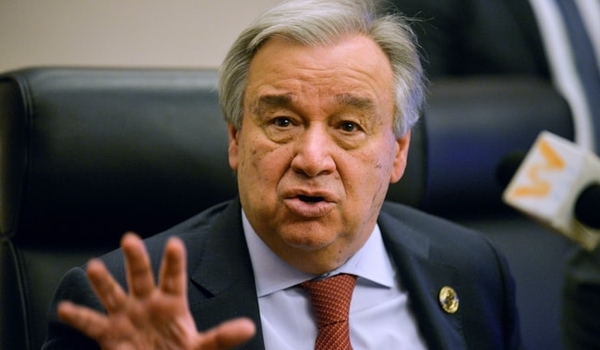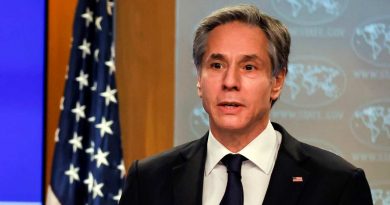UN wants Nigeria to Investigate Mass Abortion Report by Reuters as army denies complicity
Notwithstanding the strong denial by the Nigerian military authorities, the United Nations Secretary-General, Mr. Antonio Guterres, has called on the federal government to investigate allegations of systemic and coerced abortions reportedly perpetrated by its army.
Reuters had reported that the Nigerian Army was running a secret, systematic and illegal abortion programme in the country’s North-east since at least 2013.
The programme allegedly involved terminating at least 10,000 pregnancies among women and girls, many of whom had been kidnapped and raped by Boko Haram, according to dozens of witness accounts and documentation reviewed by Reuters.
But the Nigerian Army had denied conducting a years-long “illicit programme” to carry out abortions among women and girls who have been victims of Boko Haram militants, calling the report “a body of insults on the Nigerian peoples and culture.”
The Chief of Defence Staff (CDS), General Lucky Irabor, said the military would not investigate the allegation because the report was not true.
But Guterres speaking through the UN spokesman, Stephane Dujarric, called on the federal government to thoroughly investigate the allegations and punish culprits.
“The Secretary-General takes note with concern of the allegations of systemic and coerced abortions reportedly perpetrated by the Nigerian Army against women and girls who had already been victimised by Boko Haram,” Dujarric said in an email to Reuters.
He called for a thorough investigation and “immediate remedial actions and accountability measures,” if such measures were necessary.
“We call on the Nigerian authorities to fully investigate these allegations and make sure there’s accountability,” Dujarric told reporters later at the weekend.
Corroborating, a US State Department spokesperson said the Joe Biden administration was “deeply troubled.”
“Our embassy in Abuja is seeking further information, including from the government of Nigeria and stakeholders working in this space,” the spokesperson said. “We have encouraged the government of Nigeria to take the allegations seriously and to conduct a thorough and transparent investigation, and we will continue to do so.”
Meanwhile, the Nigerian military had accused Reuters of trying to blackmail the Nigerian military through “fictitious and wicked” reportage.
“Wickedness really runs in the veins of some people and it surely runs deep in the veins of the Reuters team that concocted such evil for interrogation. The fictitious series of stories actually constitute a body of insults on the Nigerian peoples and culture for, no people or culture in Nigeria practises such evil as dreamt up by the Reuters team,” the Director of Defence Information, Major General Jimmy Akpor, said in a statement.
“Irrespective of the security challenges we face as a nation, Nigerian people and cultures still cherish life. Hence, Nigerian military personnel have been raised, bred and further trained to protect lives, even at their own risk, especially when it concerns the lives of children, women and the elderly. Hence, nowhere has the Nigerian military operated that, there hasn’t been any trace or allegation of infanticide.
The Nigerian military will not, therefore, contemplate such evil of running a systematic and illegal abortion programme anywhere and anytime, and surely not on our soil,” Akpor stated.
The report is based on testimony from 33 women and girls, five health workers and nine security personnel involved in the alleged programme, and on military documents and hospital records “describing or tallying thousands of abortion procedures.”
Earlier, Nigerian military leaders denied the programme has ever existed and said Reuters reporting was part of a foreign effort to undermine the country’s fight against the insurgents.
“Not in Nigeria, not in Nigeria,” said Major General Christopher Musa, who heads the military’s counterinsurgency campaign in the northeast, in a Nov. 24 interview with Reuters that addressed the abortion programme. “Everybody respects life. We respect families. We respect women and children. We respect every living soul.”
General Lucky Irabor, Nigeria’s chief of defence staff, did not respond to requests for comment from Reuters. On Dec. 2, a week after Reuters sought an interview with Irabor and shared detailed findings and questions with his office, the military’s director of defence information released a five-page statement to reporters, and later posted it on Facebook and Twitter. Major General Jimmy Akpor said Reuters was motivated by “wickedness” and a “bullying” mentality, according to the statement.
“The fictitious series of stories actually constitute a body of insults on the Nigerian peoples and culture,” Akpor added. “Nigerian military personnel have been raised, bred and further trained to protect lives, even at their own risk, especially when it concerns the lives of children, women and the elderly.”
North-eastern Nigeria is the centre of the Boko Haram jihadists insurgency, which has kidnapped and raped women and girls.
When the women were rescued by the Nigerian military, Reuters said many of those who were pregnant were forced to abort, often without their consent while they were held in military custody for weeks or months.
According to interviews with soldiers and guards, the military and some civilians in the north-east consider that the children of insurgents are predestined, by the blood in their veins, to one day take up arms against the Nigerian government and society.
The abortion programme was allegedly set up to destroy insurgent fighters before they could be born.
Some abortions were conducted without the women’s prior knowledge, through abortion-inducing pills or injections passed off as medications to boost health or combat disease.
Reuters was unable to establish who created the abortion programme or determine who in the military or government ran it.
Abortion is illegal in Nigeria, except when the mother’s life is in danger. In the north of the country, illegally terminating a pregnancy carries the risk of a 14-year jail term.




